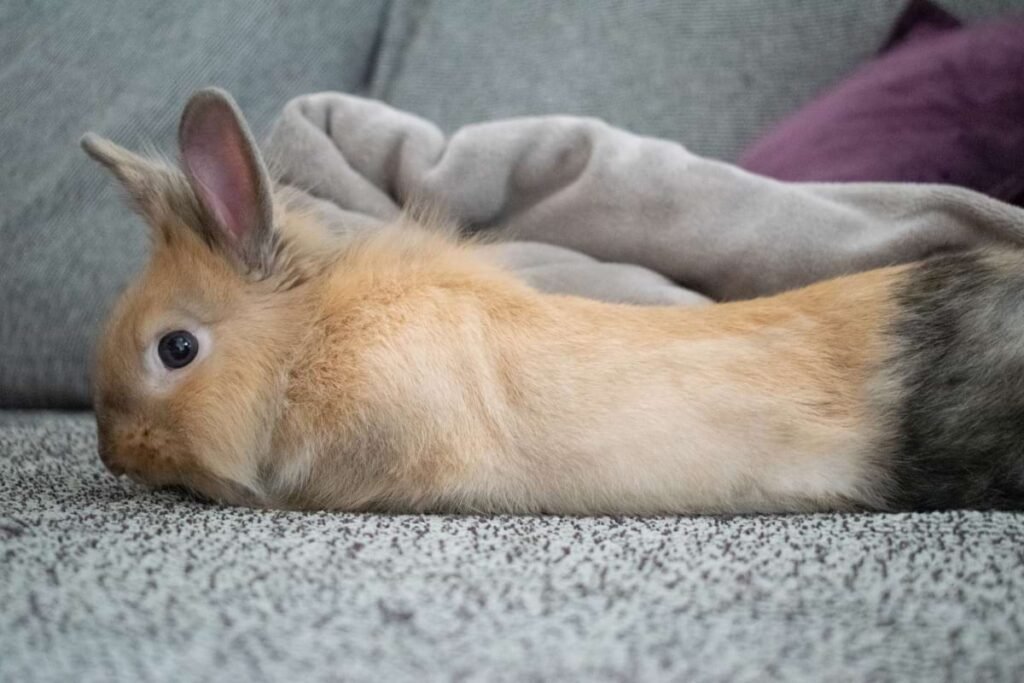Rabbits have various reasons for shaking, and not all of them are cause for concern. Minor shakes and twitches are usually harmless, resulting from hiccups, over-excitement, or calming down after vigorous exercise.
However, a shaking rabbit can sometimes indicate something more serious. It’s essential to observe their body language and look for additional symptoms beyond just shaking. By understanding the different types of shaking in rabbits, you can be prepared to provide the necessary help when needed. Let’s delve into the various causes of shaking in rabbits.
10 Causes of Shaking in Rabbits
Rabbits can shake due to a range of factors. Here are some common causes:
Deep Sleep
During the dreaming phase of deep sleep, rabbits may twitch and move their legs. This behavior can occur in various sleeping positions and is often accompanied by head nodding and ear twitching. It’s a positive sign of trust when a rabbit feels comfortable enough to enter a deep sleep in your presence.
Hiccups
Rabbits can experience hiccups, leading to short bodily twitches without any sounds. While hiccups typically resolve on their own within a few minutes, persistent or frequent hiccups may warrant veterinary attention.

Overexcitement
Rabbits are emotionally complex creatures capable of experiencing strong emotions like excitement and happiness. Over-excited rabbits may exhibit bum twitches and small shakes, which are considered a form of binky. These behaviors are normal expressions of intense emotions.
High Stress/Fear
Rabbits are susceptible to stress, which can manifest as shaking in response to fear or stressful situations. In some cases, stress may escalate to aggression, requiring a calm and supportive environment for the rabbit to relax. Providing a safe space and reassurance can help alleviate stress-related shaking.
Intensive Exercise
When rabbits engage in vigorous exercise and play, they may experience shaking and rapid breathing as they wind down and regulate their energy levels. This post-exercise shaking is a natural response and typically subsides within 15-30 minutes as the rabbit calms down.

Overheating/Heat Stroke
Rabbits are sensitive to heat and can overheat easily, leading to symptoms like shaking and panting. While rabbits may shake in an attempt to cool themselves, it’s crucial to monitor for signs of heatstroke, such as drooling, panting, lethargy, and hot ears. Providing cooling measures and seeking veterinary care are essential in cases of overheating.
Acute GI Stasis or Poisoning
Shaking while lying down can indicate gastrointestinal stasis or poisoning in rabbits. While poisoning is rare, it can have severe consequences due to rabbits’ inability to vomit. GI stasis, characterized by a bacterial imbalance, is more common and can lead to shaking in severe cases. Prompt veterinary intervention is necessary for proper diagnosis and treatment.
Ear Mites/Infection
Constant head or ear shaking may signal ear mites or an ear infection in rabbits, accompanied by symptoms like scratching, redness, and scaling in the ears. Ear infections can affect a rabbit’s balance, leading to unsteady movements and shaking. Veterinary attention is crucial for diagnosing and treating ear-related issues to prevent further complications.
Seizure
While seizures are rare in rabbits, they can occur and present as uncontrollable convulsions. Seizures may be triggered by various factors, including trauma, poisoning, old age, or genetics. If a rabbit experiences a seizure, immediate veterinary care is necessary, as seizures and strokes can be life-threatening.
Neurological Issues
Head twitching and shaking, accompanied by impaired movement and head tilt, may indicate neurological problems in rabbits. These issues can stem from brain damage or parasitic infections like E. Cuniculi. Timely veterinary assessment is essential to address neurological concerns and provide appropriate treatment.

Is It Bad if My Rabbit is Shaking?
Shaking alone is not always indicative of a serious health issue in rabbits. However, when accompanied by other concerning symptoms, shaking may signal an underlying problem. While some shaking behaviors are normal, such as post-exercise tremors or excitement quivers, persistent or severe shaking could indicate distress, illness, or neurological issues.
Conclusion
Rabbits exhibit various types of shaking, with harmless tremors being more common than severe shaking. If your rabbit displays visible shaking, it’s essential to investigate the root cause, whether it stems from emotional distress, physiological discomfort, or neurological issues. Seeking veterinary advice is crucial if your rabbit’s shaking persists or is accompanied by other concerning symptoms.

